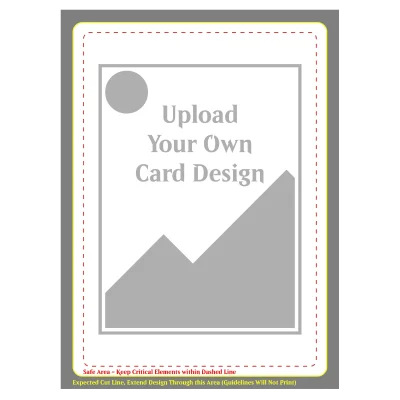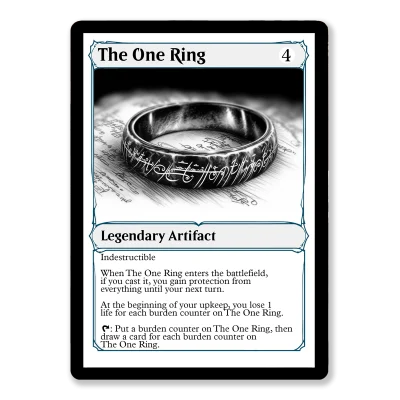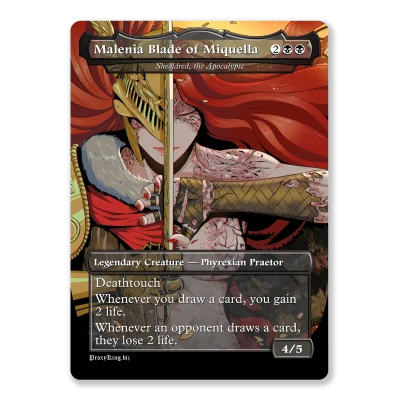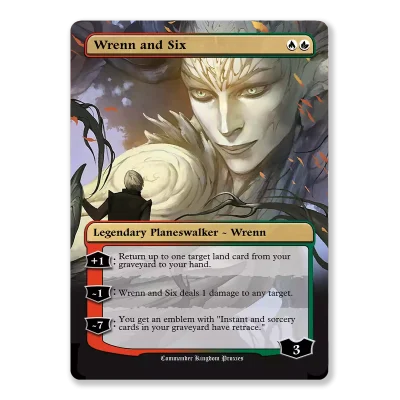Whether you’re a seasoned planeswalker or new to the multiverse, understanding MTG formats is your first step toward mastering this game. From the rapid rotations of Standard to the battles of Legacy and Vintage, each format beckons in different ways.
Today, we will cover all of the major formats in Magic: the Gathering.
Constructed Formats
Standard Format
Standard is often the starting line for players venturing into Magic: The Gathering’s competitive scene. It’s a dynamic format that includes cards from the most recent sets, typically the last two years of releases. Standard’s rotating nature makes it unique; as new sets are introduced, the oldest sets are phased out, keeping the gameplay environment fresh and challenging. This constant evolution encourages players to adapt and innovate, making it ideal for those who enjoy staying on the cutting edge of the game. Standard is perfect for players looking for an entry point into competitive play or those who relish the challenge of a continually evolving metagame.
Modern Format
Modern is a non-rotating format that spans a broader history of Magic cards, including sets from Eighth Edition onward. The allure of Modern lies in its vast card pool, allowing for a diverse range of decks and strategies that can cater to almost any play style. From fast, aggressive decks to complex, combo-driven machines, Modern has it all. The format’s stability without rotation appeals to players who want to invest in a deck that remains playable year after year. It’s a haven for veterans and players who enjoy deep strategic depth and various matchups. The high power level and permanence make Modern a favorite among players looking for a long-term, competitive experience.
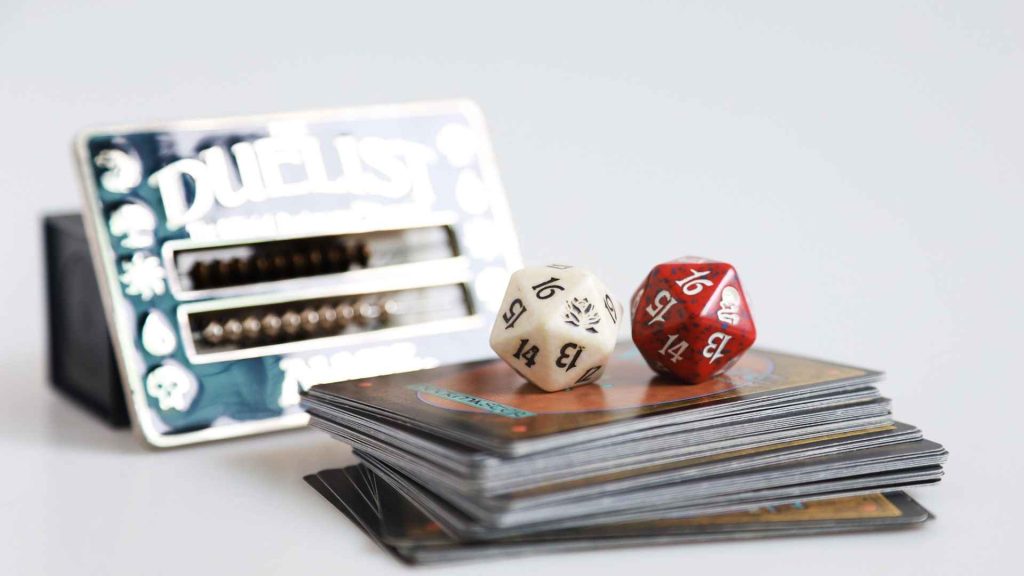
Pioneer Format
Pioneer is a newer addition to the Magic format family, featuring cards from Return to Ravnica onwards. It strikes a balance between the extensive card pool of Modern and the accessibility of Standard, offering a fresh competitive scene that’s less daunting for newcomers. Pioneer is distinct for its rapidly evolving metagame, where players can explore underutilized cards and strategies, breathing new life into past sets. This format appeals to those who’ve been playing for several years, allowing them to wield their favorite cards from recent sets in a competitive environment. Pioneer is the perfect middle ground for players looking for a format with various strategies without the extensive history and cost of older formats.
Legacy Format
Legacy allows an even broader range of cards than Modern, including nearly every card ever printed in Magic’s history, with a list of banned cards for balance. This “Eternal” format is beloved for its depth and complexity. It offers a playground for some of the most potent and iconic cards in the game’s history. Legacy’s vast card pool enables many decks and strategies, from lightning-fast combo decks to resilient control builds. While the format’s barrier to entry can be high due to the rarity and cost of many older cards, it attracts players who enjoy exploring the full breadth of Magic’s history and the strategic depth it offers. Legacy is a haven for the game’s historians and purists, who relish the opportunity to pilot decks that span the game’s entire history.
Vintage Format
Vintage is the most unrestricted of Magic’s formats, allowing almost every card ever printed, with a small list of banned cards and a more extensive list of restricted cards (limited to one per deck). This format epitomizes high-power Magic, where the most potent cards and combos are let loose. Vintage’s appeal lies in allowing players to use the game’s most iconic and historically significant cards, many of which are banned or restricted in other formats for being too powerful. The format is known for its fast-paced, explosive gameplay, where games can be won or lost in the first few turns. Despite its reputation for being prohibitively expensive due to the scarcity of older cards, Vintage attracts a dedicated community of enthusiasts who cherish the opportunity to experience Magic’s most powerful plays.
Pauper Format
Pauper is a unique and budget-friendly format where only cards printed at common rarity are allowed. This restriction leads to a surprisingly rich and diverse metagame, where players are challenged to think creatively within the confines of the most accessible card pool. Pauper stands out for making competitive play more accessible, reducing the financial barrier to entry that is present in other formats. It’s an excellent choice for players who enjoy deck building and strategy but prefer or need to keep their spending in check. Despite the limitation to standard cards, the format boasts a variety of powerful and competitive decks, making it a testament to the depth and complexity that can be achieved without the need for high-priced rare cards.
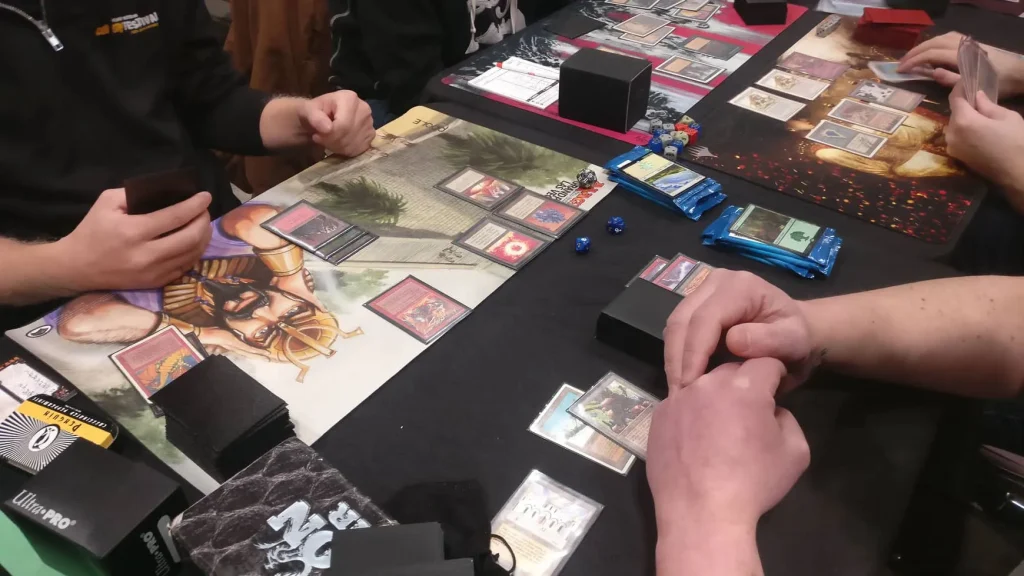
Multiplayer Formats
Commander (EDH) Format
Commander, also known as Elder Dragon Highlander (EDH), is a format centered around social interaction and creative deck building, vastly different from other competitive formats. Each player chooses a legendary creature as their “Commander” and builds a 99-card deck around that card, following specific color identity rules. The singleton rule (only one copy of any card, except basic lands) encourages diversity and unpredictability in gameplay. Commander is beloved for its casual, social nature. It is often played in multiplayer groups where politics and alliances add an extra layer of depth. This format appeals to players who enjoy expressive deck building and a more relaxed, communal gameplay experience where the journey is just as important as the victory.
Brawl Format
Brawl is a variant of the Commander format, tailored to fit a Standard-like rotation by limiting the card pool to only those currently legal in Standard. This format combines the singleton, commander-centric deck-building of Commander with the dynamic, ever-changing card pool of Standard, offering a fresh and accessible way for players to engage in multiplayer Magic with a lower barrier to entry. Brawl is particularly appealing to those new to the game or those looking for a more casual way to play with cards from the most recent sets. Its rotating nature ensures a constantly evolving metagame, making it an ideal choice for players who enjoy both the social aspects of Commander and the challenge of adapting to a changing card pool.
Limited Formats
Draft
Draft is a highly strategic and dynamic Limited format in Magic: The Gathering, where players build their decks by drafting cards from booster packs. In a Draft, players sit around a table, each with three booster packs. A pack is opened, each player selects a single card and then passes the remainder to the next player. This process repeats until all the cards are drafted. Draft requires players to make immediate decisions based on a limited pool of cards, balancing the strength of individual cards against the needs of their developing deck. It’s an excellent way for players to practice evaluating cards in a competitive environment. It particularly appeals to those who enjoy the challenge of deck building with new and varied card pools each time they play.
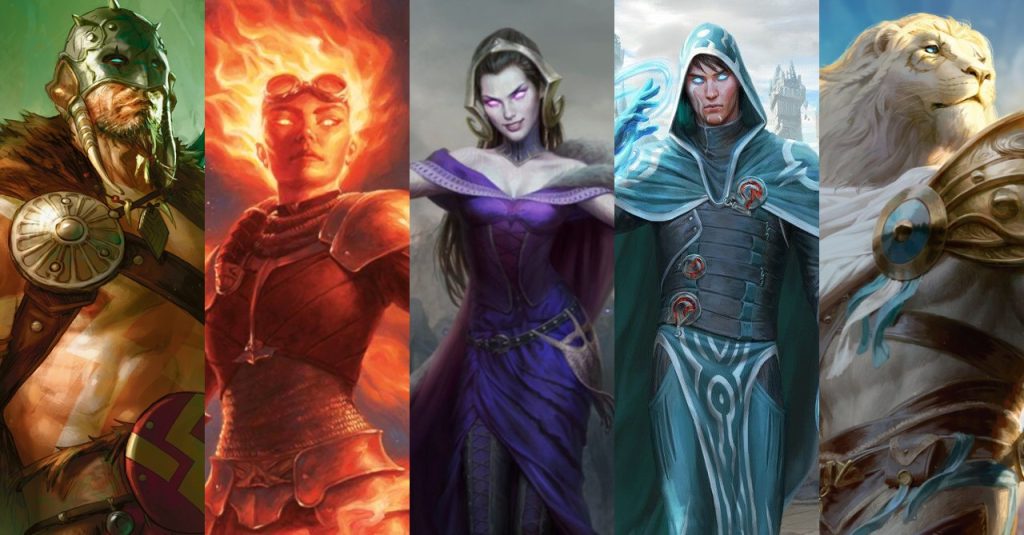
Sealed
Sealed Deck is another popular Limited format that tests players’ deck-building skills. Players receive several unopened booster packs (usually six) and construct a deck from the cards within those packs. Unlike Draft, there’s no card exchange between players, making the deck-building process more about making the best out of what you’re given. Sealed Deck is often used in tournament settings, such as prerelease events and Grand Prix, because it places all players on a more even footing, with success depending heavily on players’ ability to identify synergies and construct a coherent deck from a random assortment of cards.
Digital-Only Formats
Explorer
Explorer is a digital-only format available on Magic: The Gathering Arena (MTGA) that mirrors the Pioneer format but with a card pool limited to what’s available on the platform. It allows players to use cards from Return to Ravnica onward, excluding those yet to be digitally released. Explorer serves as a bridge for Arena players to experience a non-rotating format akin to Pioneer, offering a competitive environment with a wide array of deck-building options without needing physical card collections.
Alchemy
Alchemy is another MTGA-exclusive format designed to take full advantage of the digital nature of the platform. It features a dynamic card pool that includes all Standard-legal cards plus digital-only cards with mechanics and interactions impossible in physical play. Alchemy sets are released periodically, introducing rebalanced versions of existing cards alongside new ones to keep the metagame fresh and diverse. This format appeals to players looking for a Standard-like experience with the added twist of digital-exclusive content, offering a constantly evolving gameplay environment.
Emerging Formats
The Magic: The Gathering community is constantly evolving, and with it come new formats that challenge and refresh the way the game is played. Emerging formats, such as Explorer and Alchemy on MTG Arena, have been met with excitement and skepticism. Players appreciate the innovation these formats bring, offering new strategies and a break from the established metagame. However, they also prompt discussions about balance, accessibility, and the future direction of MTG. Community reception varies widely, with some embracing the changes for the fresh gameplay experiences they provide. In contrast, others express concern over the potential fragmentation of the player base or the impact on the game’s tradition.
Choosing a Format
Selecting the suitable MTG format is a personal decision that hinges on your play style, budget, and community. If you enjoy fast-paced games and staying on top of the latest strategies, Standard might be your arena. Diving into Modern or Legacy could be rewarding for those who relish depth, history, and a wide array of choices. Players on a budget might find Pauper or Draft formats more accessible. It’s also important to consider the local community and what formats are actively played in your area. Engaging with fellow players and participating in local events can offer insights and guide your choice.
Wrapping Up
Understanding the various MTG formats is crucial for appreciating the game’s depth and diversity. Each format offers a distinct way to engage with the game, from the cards you collect to your strategies. Whether you’re looking for competitive play, casual fun, or digital convenience, there’s a format that fits your needs. Exploring different formats can enrich your MTG experience, challenging you to think creatively and adapt.


